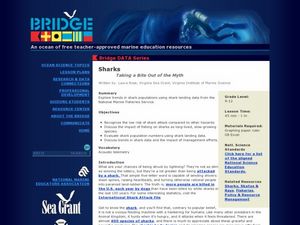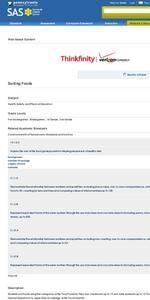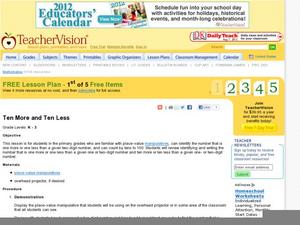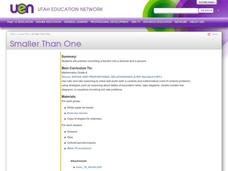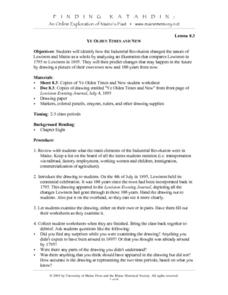ESL Kid Stuff
Measuring Parts of the Body
"How tall are you?" "Who has the longest arms?" As part of a study of the names of various body parts, language learners use rulers and tapes to measure parts of the body.
Curated OER
Pebbles, Sand and Silt -- Categorizing Fiction and Informational Books
Primary readers complete the activities in a Pebbles, Sand and Silt FOSS kit. As a class, they are given a group of rocks and they are to categorize them based on their activities in the FOSS kit. They use this information and apply it...
Curated OER
Sharks ~ Taking a Bite Out of the Myth
The first thing to know about this lesson is that the commercial fisheries data for the activity no longer seems to be available. That being said, there are fascinating links to other websites, some about the comparative odds of being...
Curated OER
Are Our Chemical Measurements Accurate or Precise?
What is the difference between accuracy and precision? This worksheet has students define the terms accuracy and precision, and compare bulleye diagrams to find examples of both. Students analyze given data and determine the accuracy and...
Curated OER
It's A Snap! (Place Value Made Easy)
Students are introduced to the importance of using place value in number systems. They view a video, play games, explore websites and research the pay scale of three jobs that interest them.
Curated OER
A Fraction of the Possibilities
Students review the conversion of fractions to decimals, develop strategies to compare fractions perform complex calculations using ratio techniques similar to the construction of fractions.
Curated OER
Finding the Percent of a Number
In this mathematics worksheet, 6th graders find the percents of various numbers. They set up the problem, estimate, and write their response. Students also compare their answers to their estimates for each problem.
Curated OER
Climate Change
Students compare weather data and draw conclusions. For this climate change lesson plan, students determine whether data collected over a period of ninety years shows a warming trend.
Curated OER
Study Buddies: Using Front-End Estimation
In this math worksheet, young scholars will work with a coach to estimate equations using front-end estimation. Students will follow a step-by-step process and notes are provided for the coach.
Curated OER
Sorting Foods
A basic lesson plan on sorting awaits your charges. They sort a variety of foods while using the food pyramid, and identify the role of the food guide pyramid in helping people eat a healthy diet. Learners use an internet tool to apply...
Curated OER
Ten More and Ten Less
Get learners to analyze two-digit numbers based on place value, and use manipulatives to add and subtract both 1 and 10. A place value chart is available, and you can project it during guided practice. Through visualizing...
Curated OER
Food Pyramid Power: Looking Back and Moving Forward
Students show their knowledge of properties of objects as it pertains to sorting and creating patterns. In this food pyramid power activity, students show their ability to use whole numbers in different representations by appling...
Curated OER
Adding Decimals with Hundredths
In this worksheet, students learn to add decimal numbers to the hundredths. Students first compare adding and subtracting decimals with the corresponding fractions in 6 problems. Then students add 35 decimal numbers mentally, filling out...
Curated OER
Ordering Numbers: True Or False Activities
In this ordering numbers worksheet, students answer forty math word problems as true or false in reference to greater than or less than.
Curated OER
Understanding Place Value
In this understanding place value worksheet, students, with a partner, problem solve and calculate the answers to seven place value exercises.
Pennsylvania Department of Education
Seeing Doubles
Students work with dominoes to recognize the number of spots on each side as they relate to addition facts. In this seeing doubles lesson, students make triangle shaped flash cards for the double facts. Students represent the correct...
Curated OER
Adventures With Maps And Globes
First graders examine the differences between a map and a globe. They discuss and identify the symbols on maps and globes, then in small groups complete a worksheet. Students then complete a Venn Diagram comparing maps and globes.
Curated OER
Smaller Than One
Sixth graders practice converting a fraction into a decimal and a percent. They explain relationships among rational numbers. They order and compare whole numbers, fractions (including mixed numbers), and decimals using a variety of...
Curated OER
Decimal Place Value Chart
In this decimal place value chart instructional activity, students work independently to fill in the blanks on the chart so that the numbers equal out correctly and the missing words are stated correctly.
Curated OER
Coin Carnival
Young scholars investigate the value of coins. In this coin value lesson, students read The Penny Pot by Stuart Murphy. Young scholars expand on skills learned in the book and engage in activities to determine the value of a mixed set of...
Curated OER
Fraction Conversion 2 (With Percents)
Fifth graders determine how to convert fractions, decimals, and percents. In this conversion lesson, 5th graders use an on-line applet to practice making these conversions. They review how to make the conversions in a whole class lesson...
Curated OER
Ye Olden Times And New
Students investigate the changes that occurred during the Industrial Revolution by comparing primary source documents from the Lewiston Evening Journal of 1895. They evaluate the document using a guided worksheet and discuss the changes...
Curated OER
Cinco De Mayo
Students make a graph identifying the immigration of Mexicans to the US. In this algebra lesson, students practice graphing as they review different trends in immigration over the past 100 years. They interpret and analyze their graphs.
Curated OER
Constancy and Change
Second graders identify three forms of matter- solids, liquids, and gases with 100% accuracy. They observe what happens when they try to put two kinds of matter into the same space and conclude that solids, liquids, and gases occupy space.




